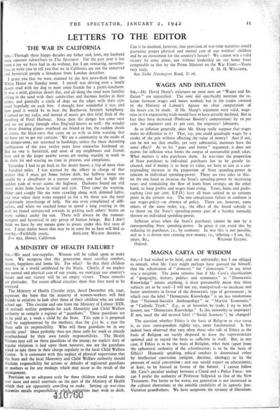WAGES AND INFLATION
Sm,—Mr. David Sharp's strictures on your note on " Wages and In- flation" are unjustified. The note did specifically mention the re- lation between wages and hours worked; but in the trades covered by the Ministry of Labour's figures no close computation of the hours can be made. If Mr. Sharp's argument were valid, wage- rates in the engineering trade would have to have actually declined. But in fact they have increased (Professor Bowley's computation) by i6 per cent. for engineers and 21 per cent. for engineers' labourers.
As to inflation generally, does Mr. Sharp really suppose that wages make no difference to it? That, say, you could quadruple wages by a stroke of the pen without affecting the value of money? And if not, can he not see that smaller, yet very substantial, increases have the same effect? As to his " guns and butter " argument; it does not mattes for inflation what forms the output of consumable goods takes. What matters is who purchases them. In war-time the proportion of State purchases to individual purchases has to be greatly in- creased, and if money is to keep its value, we have to aim at a cor- responding increase in the proportion of State spending-power in relation to individual spending-power. There are two sides to this: on the one hand to increase the State's spending-power by increasing taxes and stimulating the flow of loans from savings; on the other hand, to keep profits and wages from rising. Taxes, loans and profit- curbing (too per cent. E.P.D.) have all been carried to an extreme point in the present war. The one conspicuous failure to conform is our wages-policy—or absence of policy. There are, however, some others of the same order, e.g., the effect of the bread subsidy is to throw on the State's spending-power part of a burden normally thrown on individual spending-power.
Inflation arises when the State's purchases cannot be met by a corresponding State spending-power. In peace it can avoid this by reducing its purchases, i.e., by economy. In war this is not possible, and so it is driven into creating new money, i.e., inflating.—I am, Sir,


























 Previous page
Previous page